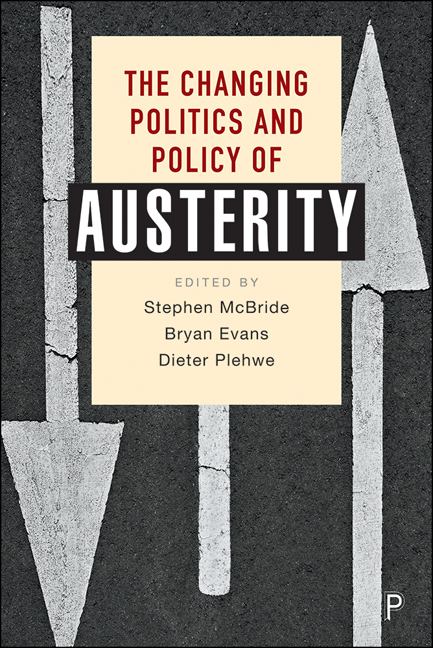Book contents
- Frontmatter
- Contents
- List of figures and tables
- Notes on contributors
- Acknowledgements
- Introduction
- PART I Austerity and the promotion of the private
- PART II Coping and casualties: labour and the social
- PART III Beyond coping: protest, pathologies and the development of real alternatives
- Conclusion
- Index
Conclusion
Published online by Cambridge University Press: 13 May 2022
- Frontmatter
- Contents
- List of figures and tables
- Notes on contributors
- Acknowledgements
- Introduction
- PART I Austerity and the promotion of the private
- PART II Coping and casualties: labour and the social
- PART III Beyond coping: protest, pathologies and the development of real alternatives
- Conclusion
- Index
Summary
Austerity, defined broadly as a compound of fiscal consolidation, public sector restructuring and labour market flexibilization, has played a key role in the decades-long hegemony of neoliberalism, and in its subsequent crisis. After a brief period of fiscal stimulus after the Great Financial Crisis of 2007–08, there was an intensification of austerity, albeit with some variety within a common theme (see Whiteside et al 2021). Its effects have influenced experience of the COVID-19 pandemic.
Considered as a ‘solution’ to the financial and economic crisis austerity policies were an abject failure. In a global system experiencing multiple crises austerity had nothing positive to contribute. Its intellectual rationale was subjected to lethal critique (Stiglitz 2011; Blyth 2013; Herndon et al 2013; Krugman 2013;). Yet the national and international economic and political elites, international organizations and national governments remained in lockstep, imposing austerity as a necessary and productive response.
Though clearly not directly responsible for the health crisis that emerged as a result of the spread of the COVID-19 virus in early 2020, some effects of austerity (and of neoliberal globalization more generally) exacerbated the situation. These included diminished public services, a precarious and low-waged labour force in affected sectors such as long-term care, the intrusion of the profit motive into such facilities where returns could be maximized through over-crowding, labour economies involving a just-in-time workforce often working in several facilities and therefore liable to spread the infection, eroded capacity of national governments and diminished industrial capacity where ‘advanced’ industrial societies were unable to supply protective equipment in a timely fashion. Austerity thus contributed to the severity of the pandemic and the lived experience of it for many.
Driven by finance and producing extreme inequality of wealth and income, austerity sustained its own economic crisis for a decade after the GFC and contributed to the multiple other crises the world is experiencing – environmental-ecological, food security, dislocation of peoples and migration, stagnant economies and now health. Compounding all this is the failure of institutions to represent popular will and respond democratically.
- Type
- Chapter
- Information
- The Changing Politics and Policy of Austerity , pp. 292 - 300Publisher: Bristol University PressPrint publication year: 2021



